As 2019 comes to a close, a few of us decided to take a look back at the last 10 years in gaming and talk about some of our favourite games from the decade. My board gaming journey since 2010 has been incredible. Over that time, I worked for a number of different publishers, traveled to countless conventions, and made some lifelong friends. I started working at Snakes & Lattes in early 2011, and that job served as a conduit for my larger gaming eduction. I learned so many new titles in the three years I spent there. Since that time, I’ve been lucky to have a front row seat to see the industry grow and evolve. Despite some bumps in the road, I think our hobby has broadened to be more inclusive, to add new voices, and move in the right direction. With thousands of games coming out each year, a decade is a heck of a long time to do a retrospective. It was difficult to decide which games to include, and which had to be cut from this list. Anyway, these were my favourites.

Few games click with me as quickly as Energy Empire did. It is a wonderful puzzle of resource management, worker placement, and disaster avoidance. You play one of the World’s great nations, and you’ll start with a different set of resources depending who you are. Your goal is to develop the infrastructure of your country, while attempting to keep the environment clean. Not an easy task. At the start of the game, you can send workers to the main board to perform actions for you. As play continues, you’ll gain Government, Industry, and Commerce cards which represent new places you can send your workers. Aside from your team of minions ready to do your bidding, you also build power plants that produce energy for you to use to activate certain actions. More powerful plants can produce more energy, but also may result in polluting your environment, which is represented on your personal board. As pollution and even nuclear contamination start to take over the landscape, you’ll feel the pain of being a poor steward of the planet. Energy Empire is an example of a game that comes together beautifully, despite having lots of moving parts.

Stefan Feld is an interesting designer. Some people love his designs, and some find them far too brown. I am the former. Theme has never been a make or break element for me in games, so Feld’s excellently designed, but flavourless titles are just fine with me. Not every game of his is a hit, but more often than not, I’m excited to try out a new title by him. Castles of Burgundy was released when he was at the height of his powers. He had had some hits like Notre Dame and In the Year of the Dragon, but CoB really announced his arrival as a talented designer. It has all of the things that make a Feld game great: turn order track, personal boards, buildings with various powers. What’s not to love? In all seriousness, I would’ve been happy putting Trajan, Rialto, or even Bruges here, but CoB is my most played of all of the Felds mentioned and it definitely has a special place in my heart.
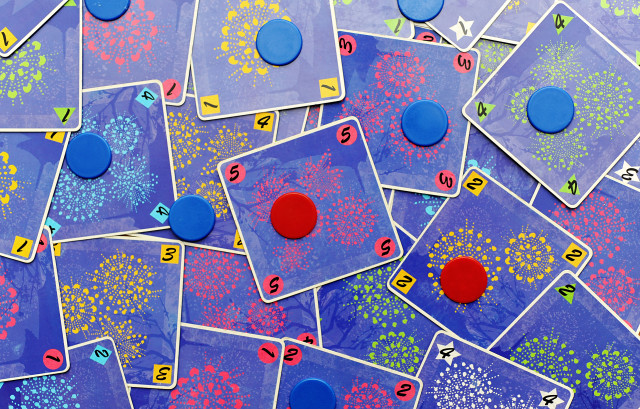
Gun to my head, I’d name Hanabi as my favourite all-time game. It’s easy to teach, you play as a team, and it’s an excruciating puzzle to try and solve. You play as fireworks experts trying to put on a show for the ages. In the game, this means playing out cards in five different suits in order from one to five. Sounds simple enough until you add in the fact that your cards are turned away from you, so everyone else can see them, but you can’t. You can play a card on your turn, give a clue, or discard a card earning a clue back. The goal is to get the best combined score adding the total of the top cards on each pile. The best possible is a 25. I chased that 25 point hand for a long ass time. Not only do you have to play perfectly, but you also have to have a little luck in the way the deck is shuffled. Hanabi is not fancy or flashy, but there is no other game when finished, I want to play again more than this one.
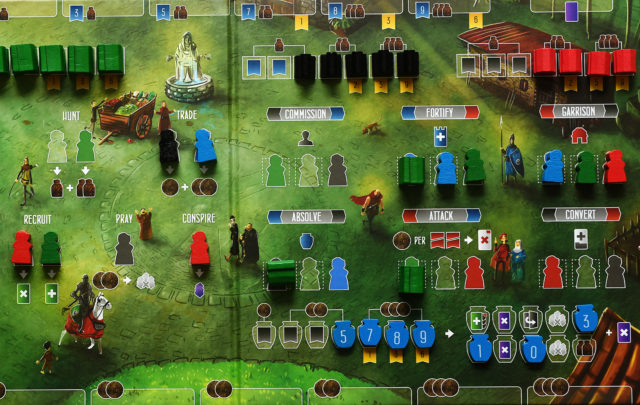
Full disclosure, this may just be recency bias, but there is no game that gets me more excited to play right now than Paladins of the West Kingdom. All of the Francia series by Shem Phillips have their own charm, but Paladins is by far the best in my books. Each one does something interesting with the worker placement mechanic. In Paladins, it manifests as a sort of tug-of-war. Each thing you want to do requires you to have established a certain attribute and in return for taking that action, you get to raise a different one. It’s one of those games where you won’t be able to do everything super well, but if you concentrate on a few different actions, you’ll have a very satisfying experience. Even when you’re losing, you’ll have a good time establishing your own little kingdom.
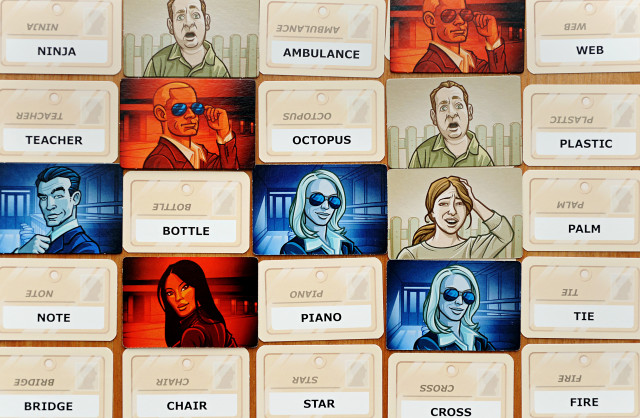
When I first saw Codenames, it was a bunch of words on scraps of paper at the Gathering of Friends. Despite the lack of flash, it was one of the bigs hits of the show. That’s what makes it such an excellent title. The interesting decisions are not derived from the complexity of the rules, but in the creativity on the players. Sure you can give a simple clue and get a single word each round, but what fun is that? You want to come up with clues to get your teammates to guess a whole bunch of words. There is something special about a game that takes a minute to explain, but each round is an excruciating, painful, and delightful experience. That’s brilliant design. I knew Codenames had made a breakthrough when I started seeing it on the shelves of friends that I would never classify as gamers.

If you include online plays, I doubt I’ve played any game more than 7 Wonders by Antoine Bauza. It’s a tight, simple, tableau-building civilization game wrapped in the drafting mechanic. Over three ages, you select cards that build your military power, develop your scientific knowledge, advance your prestige, and establish your commercial interests. You can do three different things with a card you draft. You can build it as part of your tableau, discard it for coins, or construct a stage of the Wonder you’re working on. Wonders have unique powers which, when unlocked, can give you an advantage on the competition. As a veteran player, I find myself able to predict other player’s moves based on what they’ve collected so far. The combination of cards dealt into each hand, make a huge difference in the routes you can take. However, 7 Wonders has so many paths to victory, an experienced player can find ways to get to the optimal strategy. Over the the decade there have been a number of expansions added to the base game. Some have been good, others have stunk. I’m generally a fan of straight base games and 7 Wonders is one I want to play any time I get the chance.
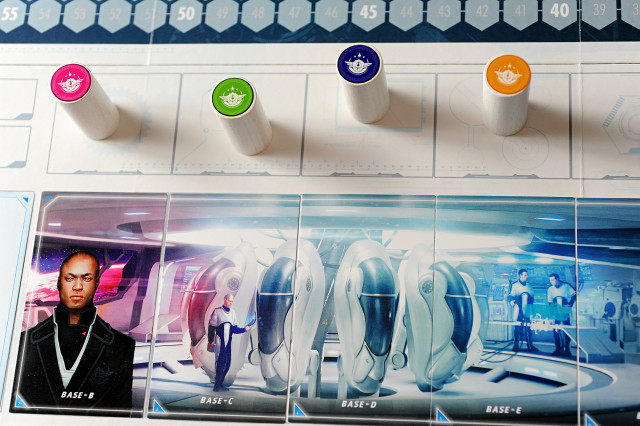
Sometimes you want to play a movie. T.I.M.E. Stories is pretty close to that experience. The idea is that the game itself is like a gaming console. You get expansion scenarios that you plug in to the game for a different time travel adventure every time you play. The first story, Asylum, was a dark, creepy, fun experience. It blew my mind the first time I played it through, and I couldn’t wait to try new expansions.T.I.M.E. Stories is like Groundhog Day. You wake up in a moment in time and try to stop some catastrophic event from taking place. If you run out of time, you go back to the starting moment, but with new information. If a guy was waiting in a closet to attack you on your last run, you know he’s lying in wait in the new timeline. Not every scenario is great, but when you get a good one, there’s no other game like it. T.I.M.E. Stories was among a number of ‘consumable’ games that came out in the last 10 years and they helped change our perception of what a game can do.
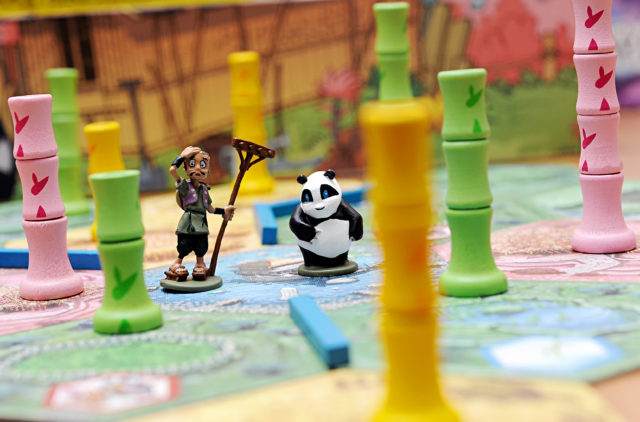
A common theme in the games I selected for this list is creativity. A common theme in the games of Antoine Bauza is also creativity. It should come as no surprise that this is his third appearance on the list. There is really no comparable games to Takenoko. The Emperor of Japan has been gifted a giant panda and the royal gardener is working hard to keep enough bamboo growing to feed this voracious beast. You gain points by completing goal cards which may be related to the layout of the garden, the size and colour of bamboo stalks, or the bamboo the panda has eaten. Overall, it’s a very silly game, but with amazing table presence, unique rules, and high replayability, it’s one of my favourites of the past decade.

Humans are stupid, and one day, it’s going to be necessary for us to move to other planets and start destroying them. In Terraforming Mars, you play the head of a major corporation doing your part to make the planet inhabitable for future settlers. To do that, you must create oceans, raise the temperature, and infuse oxygen to the atmosphere. You spend turns buying project cards from your hand, which might be a one-time event or they my have an on-going benefit to your efforts. With over 200 project cards, the goal is to find synergies and exploit that strategy. Almost every card has some planet-state requirement that must be met before they can be built, so getting the timing right is important too. Ideally you’d like to keep every card you get, but each one costs you precious money to keep in to your hand. It can be panful to let them go sometimes, but you have to if you’re going to have a successful expedition to Mars. This is another one of those games that you can play over and over again and not use the same strategy twice. There is a ton of depth, but the rules are surprisingly accessible. Science for the win!
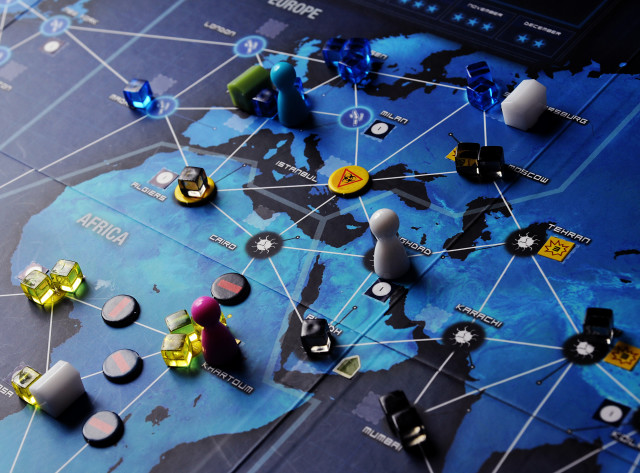
I described playing T.I.M.E. Stories as playing a movie, and I think the same can be said for Pandemic Legacy. It took what was already a really good game and added the element of permanence. Players will take a different path depending on the decisions that they make, but regardless of how their story unfolds, the experience is thrilling. Opening envelopes and boxes, adding stickers to the board, introducing new experts creates a story and an unforgettable play experience. RISK Legacy definitely deserves a nod for introducing the concept of changing our games permanently, but the idea got fully realized in Pandemic Legacy. I don’t think there’s a game that shot to the top of the BGG rankings faster than this one. It was a phenomenon. Everyone was playing it, and the real proof of concept, was that they were playing through the full game more than once, making different decisions the second time around. In the past, some may have balked at the idea of a ‘consumable’ game, but with Pandemic Legacy, you likely got more plays out of it than many other traditional games sitting on your shelf. You just had to find out what happened next. No other game on the list changed the hobby more than Pandemic Legacy.
Comments
No comments yet! Be the first!